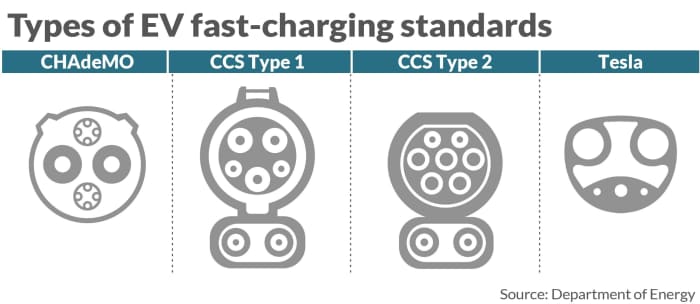This post was originally published on this site
Tesla Inc.’s fast-charging standard is becoming the predominant standard in the U.S., boosting Tesla’s stock and opening up new revenue streams for the electric-vehicle maker.
Tesla shares
TSLA,
are looking at a gain of more than 5% this week, adding to an already spectacular May and June, with the stock up nearly 60% from the end of April. It has doubled so far this year, compared with an advance of about 14% for the S&P 500
SPX,
The latest boost came as General Motors Co.
GM,
and Ford Motor Co.
F,
announced within weeks of each other that owners of their EVs will be able to use Tesla’s Superchargers, the company’s fast-charging network with charging stations usually located near major highways.
Tesla has pioneered a fast-charging standard it calls the North America Charging Standard, or NACS. GM and Ford EVs use the Combined Charging Standard, or CCS, which is also used in Europe and elsewhere. Those two companies have promised to employ the NACS standard in their EVs by 2025 and to provide adapters in the meantime.
There are other standards in use worldwide, including CHAdeMo, which was developed by a Japanese utility company and several Japanese automakers. The name is a pun on the Japanese for “Let’s have tea while charging.”

Uncredited
Tesla is a momentum stock, and as such, “positive news flow often has this type of effect on the stock price,” said CFRA analyst Garrett Nelson.
It would be impossible to quantify precisely how much additional revenue will be generated, he said, but charging was Tesla’s second-fastest-growing business segment last quarter on a year-over-year basis, accounting for about 8% of total revenue.
“Tesla will benefit from increased revenue due to higher Supercharger utilization, and it should help boost the EV sales of automakers such as Ford and GM by allowing their customers to have access to the largest and fastest charging-station network in the U.S.,” he said.
Some details of the arrangements are still pending, but the agreements will also help Tesla qualify for federal EV-charger dollars, another “big positive,” the analyst said.
Tesla Chief Executive Elon Musk said back in 2021 that he wanted to open up Tesla’s fast-charging network to others. Tesla had to develop its own standard because at the time it was the only maker producing long-range EVs, he has said.
Turf wars at the beginning of technological shifts are common, said Amy McGuire, head of development at Highland Electric Fleets, which focuses on electrifying school-bus fleets. In general, people “don’t create the standards first,” McGuire said. “We sort of build as we go.”
See also: Tesla Model 3s now qualify for $7,500 in federal tax credits
The electric school buses that Highland helps promote use the CCS standard, which has the backing of standards-development organization ISO. She said she has heard some bus drivers and others say that the CCS devices look a bit more intimidating — perhaps more industrial-looking and bulky and not as sleek as NACS devices, McGuire said.
In practical terms, she believes there’ll be enough time to have a transition toward unified charging standards for heavy-duty vehicles, while for personal EVs, the cost of an adapter, if needed, would be unlikely to make a difference.
Charging Interface Initiative, or CharIn, an industry association that has promoted the CCS charging standard, said this week it was working to convene a task force to submit NACS to a standards-development organization in order to “unify the charging standards market in North America.”
“NACS is not yet a standard and does not provide an open charging ecosystem for industry to build upon,” said the organization, which counts utility companies, automakers and others as members.
Such a process “ensures proper peer review of the technology and the ability of all interested parties to contribute to the development of this standard,” it said.
Charging companies including EVgo Inc.
EVGO,
and ChargePoint Holdings Inc.
CHPT,
have also chimed in, saying that they will be adding NACS connectors to their fast-charging networks across the country.

